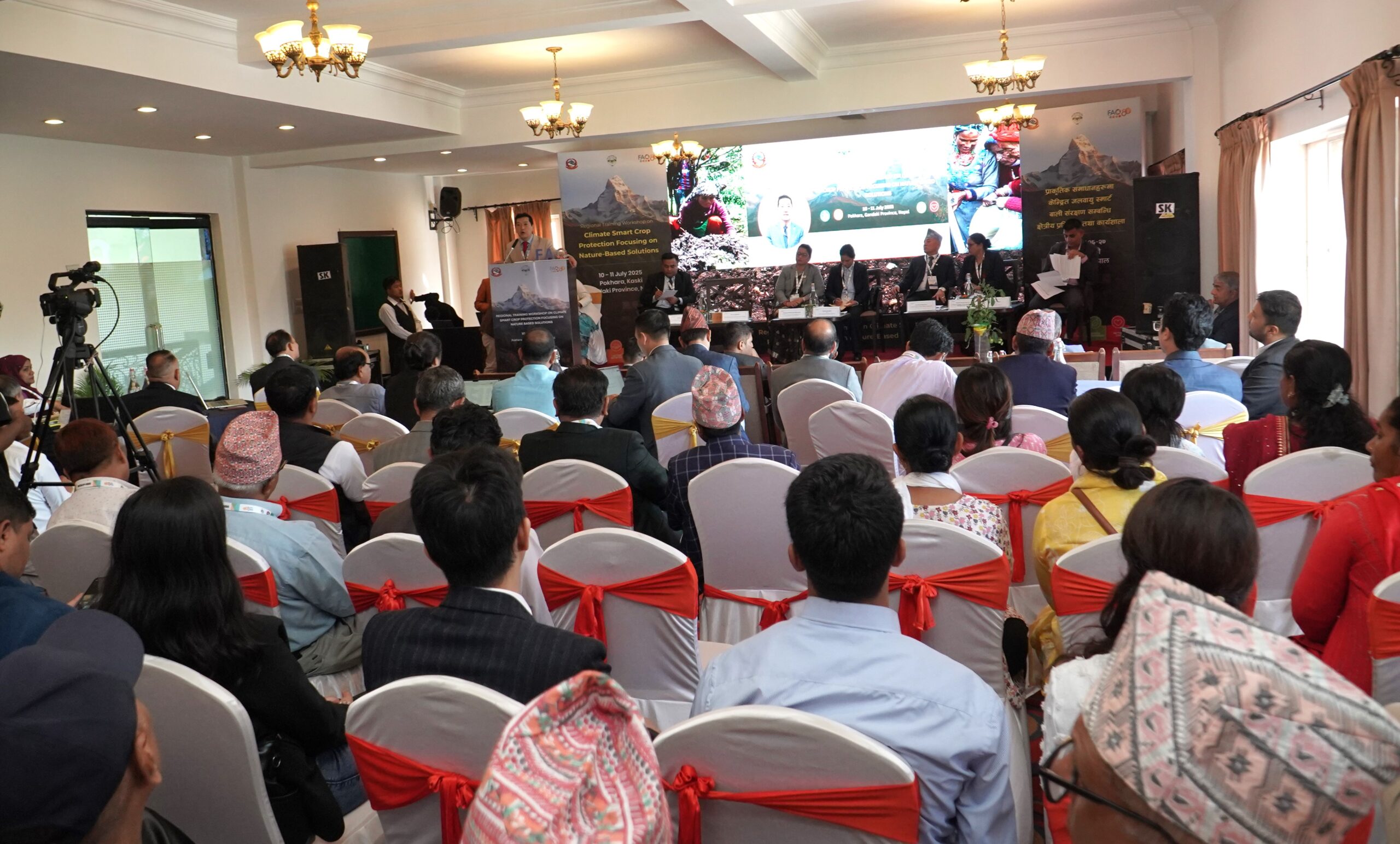Kathmandu. A regional workshop promoting climate-smart crop protection through nature-based solutions concluded successfully in Pokhara, bringing together government officials, technical experts, researchers, development partners, and farmers from across the Asia-Pacific region.
The event, organized by the Food and Agriculture Organization (FAO) of the United Nations in collaboration with the Government of Nepal, focused on sustainable plant protection strategies as a response to the growing impacts of climate change on agriculture.
The workshop served as a platform for participants from Nepal, Bangladesh, Cambodia, and Vietnam to exchange knowledge, share national experiences, and strengthen regional cooperation for eco-friendly and resilient agricultural practices.
Speaking at the event, Mr. Ken Shimizu, FAO Representative for Bhutan and Nepal, thanked the Gandaki Province government for its support and stressed the urgent need to address climate-related agricultural threats through sustainable methods. “Plant protection rooted in nature-based approaches is essential for the future of resilient agriculture,” he said.
Dr. Yubak Dhoj GC, Senior Plant Production and Protection Officer at FAO’s Asia-Pacific office, underscored the importance of integrating indigenous knowledge and nature-based methods into national policies. “These approaches not only reduce environmental damage but also boost productivity,” he stated.
The event highlighted success stories like that of Shakuntala Chaudhary, a local farmer who transitioned to organic pest control using Trichoderma and natural sprays. “Chemical pesticides had stopped working for me. After training, I found natural methods to be more sustainable and effective,” she shared.
Gandaki Province’s Secretary for Agriculture, Mr. Basudev Regmi, called for an integrated approach to address the climate challenges facing farmers, while Dr. Durga Devkota from the College of Natural Resources Management emphasized the need for education and scientific innovation to reduce reliance on chemical pesticides.
Other key speakers included Mr. Bhoj Raj Sapkota from the Plant Quarantine and Pesticide Management Centre, who highlighted the need for science-backed solutions and praised FAO’s support in enhancing Nepal’s plant protection systems. Minister Padma GC Shrestha of Gandaki Province reiterated the necessity of moving toward biological alternatives for long-term sustainability in agriculture.
Country representatives shared their progress in adopting nature-based solutions. Bangladesh emphasized shifting from chemical to biological pest management. Cambodia showcased its monitoring of natural enemies to combat Fall Armyworm.
Vietnam shared its CO₂-reducing rice models and legal reforms. Nepal, through Dr. Shanta Karki from the Central Agricultural Laboratory, presented outputs such as SOPs, awareness materials, and capacity-building efforts for nature-based crop protection in tomatoes and mandarins.
A series of technical sessions also took place. Experts like Mr. Salik Ram Adhikari highlighted tomato and mandarin production challenges in Gandaki Province and shared research on biopesticides and organic nutrients. Mr. Drona Budhathoki and Mr. Netra Prasad Bhatta detailed Nepal’s regulatory progress and the role of biofertilizers in enhancing soil health.
Professor Sundar Tiwari from Agriculture and Forestry University presented research on pest migration, climate-induced diseases, and the use of digital tools and integrated pest management. Dr. Debraj Adhikari emphasized indigenous citrus crop management practices in Nepal’s hilly regions, advocating for eco-friendly techniques such as biological control and pollinator conservation.
Participants reviewed a draft Regional Biocontrol Guideline aimed at harmonizing biopesticide registration across Asia-Pacific countries. Concerns were raised about regulatory delays, and experts called for better coordination and quality control standards.
Field visits to Chaudhary Agro Farm and a mandarin orchard in Pokhara demonstrated real-world applications of nature-based techniques, such as composting and biological pest control. Delegates also toured the Plant Protection Laboratory in Gandaki Province.
The workshop concluded with a strong commitment from all stakeholders to promote nature-based agricultural practices, invest in research, and reduce reliance on chemical inputs. The event reinforced the role of collaborative regional action in building climate-resilient, sustainable, and environmentally responsible food systems.


